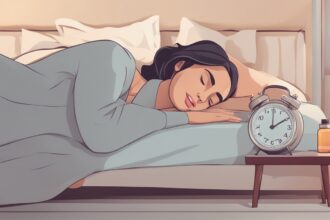Have you ever wondered how fasting might influence your sleep? If you’re exploring intermittent fasting or other fasting methods for health benefits, you might be curious about the connection between fasting and sleep quality. Many people report changes in their rest patterns when they start fasting—some feel more energized, while others struggle with restlessness. In this post, we’ll dive deep into the fascinating relationship between fasting sleep quality, uncover the science behind it, and share actionable tips to help you get the best rest possible while fasting. Whether you’re a seasoned faster or just starting, understanding this connection can make a world of difference in your wellness journey.
The Science Behind Fasting and Sleep Quality
Fasting, particularly intermittent fasting, involves cycling between periods of eating and abstaining from food. This practice impacts various bodily processes, including hormone regulation, metabolism, and even brain function—all of which play a role in fasting sleep quality. Research suggests that fasting can influence the production of melatonin, the hormone responsible for regulating sleep-wake cycles. When you fast, your body may enter a state of ketosis, where it burns fat for fuel, potentially altering brain chemistry and promoting relaxation. However, fasting can also increase cortisol levels, a stress hormone that might disrupt sleep if not managed properly. Studies, like those published in the Journal of Clinical Endocrinology & Metabolism, indicate that timing your fasting window (e.g., eating earlier in the day) can align better with your circadian rhythm, enhancing rest.
How Fasting Can Improve Sleep
For many, fasting offers surprising benefits for sleep. By reducing late-night eating, you give your digestive system a break, which can prevent discomfort and promote deeper rest. Fasting may also improve insulin sensitivity, balancing blood sugar levels that, when unstable, can cause nighttime awakenings. Some fasters report feeling more mentally clear and less anxious, which contributes to better fasting sleep quality. Additionally, fasting triggers autophagy—a cellular cleanup process—that may support brain health and indirectly improve sleep patterns. If done mindfully, fasting could be a game-changer for those struggling with insomnia or restless nights.
Potential Challenges of Fasting on Sleep
While there are benefits, fasting doesn’t always guarantee better sleep, especially in the beginning. Hunger pangs during a fast can keep you awake, particularly if you’re new to skipping meals. Dehydration, a common side effect of fasting if you’re not mindful of water intake, can also lead to fatigue and poor sleep during fasting. Moreover, fasting can temporarily increase stress hormones like cortisol, especially during prolonged fasts, making it harder to relax at bedtime. If your fasting schedule conflicts with your natural body clock, such as eating too late or skipping breakfast when your body expects fuel, you might experience disruptions in your sleep cycle. Recognizing these challenges is the first step to overcoming them.
Tips to Optimize Fasting Sleep Quality
Balancing fasting and rest doesn’t have to be a struggle. With a few adjustments, you can enhance your fasting sleep quality and wake up feeling refreshed. Here are some practical strategies to try:
- Time your eating window earlier in the day, such as 12 PM to 8 PM, to avoid late-night meals that disrupt digestion and sleep.
- Stay hydrated during fasting hours by sipping water or herbal teas to prevent dehydration-related fatigue.
- Incorporate calming pre-bed rituals, like meditation or reading, to reduce stress and ease into sleep.
- Avoid caffeine or stimulants close to bedtime, as fasting can heighten their effects on your nervous system.
- Listen to your body—if hunger keeps you awake, consider a small, nutrient-dense snack like a handful of nuts during your eating window.
Lifestyle Habits to Support Sleep While Fasting
Beyond fasting-specific tips, your overall lifestyle plays a huge role in how well you sleep. Combining healthy habits with your fasting routine can amplify the benefits for fasting and rest. Here are some additional ideas to create a sleep-friendly environment:
- Maintain a consistent sleep schedule, going to bed and waking up at the same time daily, even during fasting periods.
- Limit screen time an hour before bed to reduce blue light exposure, which can suppress melatonin production.
- Exercise regularly, but avoid intense workouts close to bedtime as they might energize you instead of winding you down.
- Create a cool, dark, and quiet bedroom environment to signal to your brain that it’s time to rest.
Who Should Be Cautious with Fasting and Sleep?
While fasting can be beneficial for many, it’s not a one-size-fits-all solution, especially when it comes to fasting sleep quality. Certain groups should approach fasting with caution. If you have a history of sleep disorders like insomnia or sleep apnea, fasting might exacerbate symptoms, especially if hunger or stress levels spike. Pregnant or breastfeeding individuals, those with chronic illnesses, or anyone on medications affecting metabolism should consult a healthcare provider before starting a fasting regimen. Additionally, if you notice persistent fatigue, irritability, or worsening sleep after beginning fasting, it might be a sign to adjust your approach or seek professional guidance. Prioritizing both nutrition and rest is key to sustainable health.
In conclusion, the link between fasting and sleep is complex but full of potential. When done thoughtfully, fasting can enhance fasting sleep quality by aligning with your body’s natural rhythms, reducing digestive stress, and promoting mental clarity. However, challenges like hunger, dehydration, or hormonal shifts can throw a wrench in your rest if not addressed. By experimenting with fasting schedules, staying hydrated, and adopting sleep-friendly habits, you can find a balance that works for you. Remember, everyone’s body responds differently, so listen to yours and adjust as needed. Have you noticed changes in your sleep while fasting? Share your experiences or questions below—I’d love to hear how your journey with fasting and rest is unfolding!






